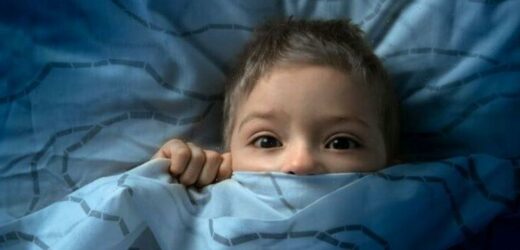Dr Michael Mosley on the importance of routine for sleep
We use your sign-up to provide content in ways you’ve consented to and to improve our understanding of you. This may include adverts from us and 3rd parties based on our understanding. You can unsubscribe at any time. More info
Dreams — and nightmares, their less pleasant counterpart — are phenomena that typically occur when one passes through the rapid-eye-movement (REM) stage of sleep, when brain patterns are similar to those observed in waking hours. It is estimated that around 60 percent of young children suffer from nightmares which can, if recurrent, interfere with sleep patterns and result in fears surrounding falling and staying asleep. Furthermore, these nightmares can have wider impacts, with around half of all parents of kids aged 3–5 reporting their sleep being disrupted by having to tend to their children at night — which can have negative effects on cognitive function, health and wellbeing. Accordingly, simple methods to help children cope with nightmares are much needed.
In their study, clinical psychologist Professor Michael Gradisar of Australia’s Flinders University and his colleagues recruited 56 children aged between 3–10.
Each child, along with one of their parents, was then assigned to either an intervention group or a control group, with the former given an alleged “Dream Changer”.
This gadget was built to resemble a television remote control with a single button that does nothing but cause the body of the device to emit a blue light.
However, the parents were asked to tell the children that the “Dream Changer”, when waved around with the button pressed, had the ability to change the dreams they had — much like how a remote could be used to switch a television to a better channel.


A suggested introductory gambit included the following explanation for the kids: “Dreams are like videos we watch in our sleep — our brain creates them, and we watch them with our eyes shut. From now on you decide which “video” to watch in your sleep.
“When you get into bed, think about a good dream you’d like to watch in your sleep tonight. And if a bad dream starts screening, use this [the Dream Changer] to change it.”
During the study period, which lasted for two weeks, the parents in both the intervention and control groups were asked to report back on how many nightmares the children experienced, and the level of sleep-related anxiety they felt after one and then two weeks.
In addition, the parents of the children given a Dream Changer placebo were asked to complete a similar follow up three months after the study.


The researchers found that the parents of children who were given a “Dream Changer” reported that their kids had fewer nightmares and decreased sleep anxiety — with such improvements appearing to be maintained in the weeks after the study concluded.
They said: “Our findings provide preliminary evidence for the acceptability and efficacy of this brief and easily accessible intervention in reducing nightmare frequency and sleep anxiety.
“The average number of nightmares per week decreased from 3.4 at baseline to 1.6 at post-treatment.”
The same improvements, however, were not seen with the members of the control group.
While use of the “Dream Changer” concept made children feel better, it did not appear to have a significant impact on the amount of sleep they got, nor on the parents’ levels of daytime sleepiness.
DON’T MISS:
US reveals hypersonic missile test, risks escalating Russia tension
Putin threatens to STARVE Germany in horror retaliation to measures
WHO scrambles to make contingency plan for ‘chemical assaults’ in Ukraine

According to the researchers, future research will be required to confirm the findings on larger cohorts of children — and over longer intervention periods.
The team also noted that their study had some limitations, in particular, surrounding how the children’s nightmare frequencies, sleep patterns and sleep anxiety were reported by the parents rather than measured directly, for example by means of activity detectors.
They added: “Parents may not accurately remember or be fully aware of their children’s nightmares or night-time awakenings.”
The full findings of the study were published in the journal Sleep.
Source: Read Full Article


